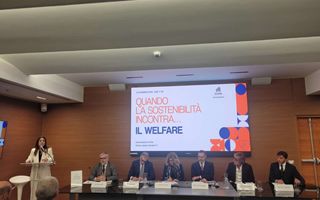(Finance) – In the last decade the topic of corporate welfare has fully entered the national debate and this visibility has been further strengthened by a varied and fragmented albeit significant regulatory framework, which increasingly delegates the care of workers’ well-being to private initiative. Goods, services, benefits, not deriving from national collective bargaining, are provided ad personam or to all employees on the basis of levels of remuneration, classification and company seniority, reiterating the generational and gender differences existing in companies. Is it possible to imagine and make operational a new welfare model that sees an integrated public and private commitment, applicable in both sectors, and which is attractive for young people? What institutional tools can be put in place to encourage a better propensity to work and training courses that provide opportunities for professional placement? These and many other topics were discussed last night at the headquarters of the Civita Association during new appointment of the “When sustainability meets…” cycle dedicated to welfare and in which they participated Simonetta Giordani, general secretary of the Civita Association, Vincenzo Caridihead of the Department for labour, social security and insurance policies and for health and safety in the workplace of the Ministry of Labor and Social Policies, Andrea GranelliCEO of Kanso and founder of Venture Thinking, Daniele Di FaustoCEO of efM and founder of Venture Thinking, Liliana Fratini Passi, director general CBI, Mauro Ghilardichief People ad Transformation officer A2A, Giorgio Graziani, CISL confederal secretary, Michele Samoggia, Director of External Relations Philip Morris Italy.
In the event it was underlined that the traditional welfaredespite having offered fundamental responses to society’s needs, is today faced with unprecedented challenges: the aging population, social inequality, climate instability and rapid changes in the labor market. In this context, the sustainability becomes a key concept for redefining welfare, not only guaranteeing resources for future generations, but building models that promote well-being, equity and resilience. This means, for example redesign company policies to promote a balance between professional and private life, invest in social infrastructure that respect the principles of circular economy, promote social inclusion through tools that enhance diversity and talent, regardless of gender, age or background.
The meeting also addressed the theme of corporate welfare which is no longer seen as an additional cost, but as a fundamental investment to create shared value which takes on a dual function: internal, as a lever to improve the quality of life of employees, promoting the balance between work and private life and promoting health and well-being and externally, as a tool to generate value in local communities, through initiatives that promote social inclusion, equal opportunities and training.
“Today we have the opportunity to build a welfare system that is truly sustainable, a model that is not limited to responding to emergencies, but which looks to the future with courage and innovation, with the aim of building a development model that puts people, planet and prosperity,” he said Jordans –. As the Civita Association, we are ready to do our part, making our experience, our networks and our capacity for dialogue available. Together we can transform today’s challenges into opportunities for tomorrow.”
“Young people need greater attention to the person than previous generations and there is a need to personalize the individual approach, especially in an era characterized by high technological transformation – he stated Caridi –. I tie corporate welfare very much to the future and I believe that in 20 years we will have a society in which welfare will be fundamental for any type of worker choice. I believe that AI will be able to replace not only repetitive jobs but also those with higher skills. The most forward-thinking companies will need to invest in a personalized approach to attracting talent.”
“On the one hand we have companies looking for new professionals and on the other a limited offer in numbers. There remains a problem of a very large gender gap and a complicated youth condition. Young people and women are looking for adequate time and wages and this in Italy sees us in a difficult situation – he stated Graziani –. The only element that eliminates the possible subjectivity of some enlightened companies are welfare agreements that involve the entire supply chain. For us, worker participation in the company is the future. We are for responsibility and for the protagonism of businesses and workers who look to common growth. Talking about welfare is like talking about wages. Sometimes training is not considered welfare but instead it is welfare by definition because it builds the person and not just skills. Working on skills but also on the ability to stay in the company is fundamental.”
“Finding the right skills today is a fundamental issue. From this point of view, welfare plays a fundamental role and is the area in which the company and employee come into contact in a more empathetic way. The company must understand that an employee has needs that evolve throughout life and must be taken care of and Philip Morris is working hard on this through a series of concrete projects – he stated Samoggia –. The great challenge is to ensure that the issue of welfare also becomes central for SMEs, the true backbone of the Italian economic system.
